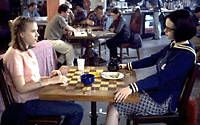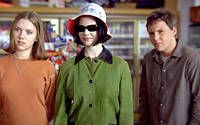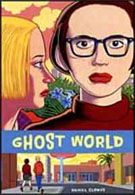Sometimes when I’m sick of Hollywood studio product I’ll go to the Valley Art Cinema in Tempe. They generally present foreign films or odd little films that don’t really merit widespread release. But sometimes, they run independent films that but for the grace of a huge advertising budget or the time to develop a bigger audience could become substantial hits.
It is this third category that the finest American films often end up occupying. The Coen Brothers lived in the art film ghetto before they became stars, as did Quentin Tarantino or Spike Lee or Kevin Smith before someone with deeper pockets decided to take them aboard. Once in a while, a film such as “American Beauty” or “Memento” escapes the ghetto and becomes a sleeper hit. Terry Zwigoff’s sharp urban comedy “Ghost World” should do the same if there is any justice in the world.
“Ghost World” opens with Enid (Thora Birch) and Rebecca (Scarlett Johansson) suffering in ennui and disbelief at their high school graduation as an ex-druggie gives a hilarious “inspirational” speech from a wheelchair. They are so offended by the superficiality of everyone around them that they view the entire civilized world from a contemptuous distance. Rebecca is a conventionally pretty girl who appears to want to present herself simply as a rather morose plain Jane, but Enid goes for a retro look with bobbed hair and horn rim glasses to accentuate her disdain for anything that smacks of superficiality, conventionality or trendiness. Of course, those around her don’t get it and think she’s simply behind the times. So serious and smug are the girls in their ironic disgust with pretense and manufactured identities that they fail to realize something fairly simple: they have trapped themselves within manufactured identities as well, where anything resembling true friendship or love must be held at a sarcastic distance or the whole façade will crumble. Indeed, anything resembling simple pleasure is greeted with an ironic smirk: “That's so bad, it's good." "No, that's so bad, it's gone past good, and back to bad again." Each needs the constant reassurance from the other that she’s being contemptuous enough to maintain the proper distance. I was reminded that kids like this are everywhere: the kind of person who says “This is so cool,” and when you ask them if they’re being sarcastic they kind of go blank, as if to say “I’ve been acting this way so long I’m not really sure anymore.”
So far, so good. But this movie isn’t satisfied with simply presenting these complicated young women and the people they alternately associate with and torment. Manufactured identities may work for a while in school, but out in the real world reality has to take hold. This begins to happen when the girls pull a rather cold-blooded prank on an older man named Seymour (Steve Buscemi). Something resembling remorse begins to haunt Enid, as they tail Seymour and discover that he is a real human with real feelings and his own set of quirks that have isolated him from society as well. She begins to feel a semblance of honest affection but still keeps her distance: “He’s the exact opposite of all the things I hate” is the most she can say. Enid begins to spend time with him and makes it her mission to find him a girlfriend. She suggest finding someone who shares his interests (he collects old 78s and advertising art), but that won’t work: “I hate my interests.” These are kindred souls indeed - for a time.
Then, Rebecca begins to show signs of partial surrender to the plastic society that the girls have been holding at bay. She takes a real job (and is concerned when Enid doesn’t) and hints that she wants a boyfriend - and would be willing to settle for one of the cute pseudo-bohemians that they sneer at. Enid, on the other hand, continues attempting to stay true to her manufactured persona and refuses to make a firm decision to find work or even fully commit to getting an apartment with Rebecca. She continues to ignore the fact that she is loved by her friends and father and even tries to be oblivious to the fact that she loves them as well. Then, with some (ironic) help from Enid, Seymour lands in an uneasy relationship with a woman closer to his own age. Enid is eventually forced to see that lives and personalities inextricably intertwine and that selfish actions, like it or not, tend to have emotional consequences…
Okay, I’ll drop the plot now, since the plot isn’t the point anyway. This film exists mainly to paint its sympathetic though realistic and incredibly flawed characters, follow them around for a while, and then send them off to their uncertain futures. Even the main supporting characters (especially Illeana Douglas as an uber-PC art teacher and Bob Balaban as Enid’s uncomprehending but supportive dad) are fully realized, recognizable human beings that become lovable despite their quirks.
In the end, I think “Ghost World” is best appreciated as a handful of hilarious character studies with that of Enid at its center. Most critics seem to picture it as an attack on the superficial values of America, but I (a middle-class professional type with both feet firmly planted in artificial America) prefer to see it as a celebration of both sides of the fence. I think it’s a recognition that whoever you are and whatever image you impose upon yourself, the reality is that we are all human beings with human emotions and the need to connect with, understand and unpretentiously allow ourselves to love others. I find it interesting that most seem to ignore the fact that Enid’s view of the world is perhaps as manufactured and fraudulent as those with less uncluttered vision, and may even be more stifling and unrewarding in the end. There are moments (as when she confides that she can’t tell a boy she likes him because it’s inconsistent with her image) when she nearly admits as much.
However you see it, “Ghost World” is a treasure of insightful and accurate characterization with some of the biggest laughs and brightest moments of recognition of any American film in recent memory. It presents characters that we can truly feel affection for and hope for the best for. We find ourselves saddened at the movie’s end to have to let these people, warts and kinks and all, go on without us. It’s a perfect movie for this time in our nation’s history, for it appears to uphold whatever values the individual viewer brings to it as it says “Yeah, you’re weird and confused but you know what? You’re so cool.” Is it being ironic? I don’t think even the movie knows for sure. And that’s fine with me.
- A Review By Jason Pohlman






Most Popular




